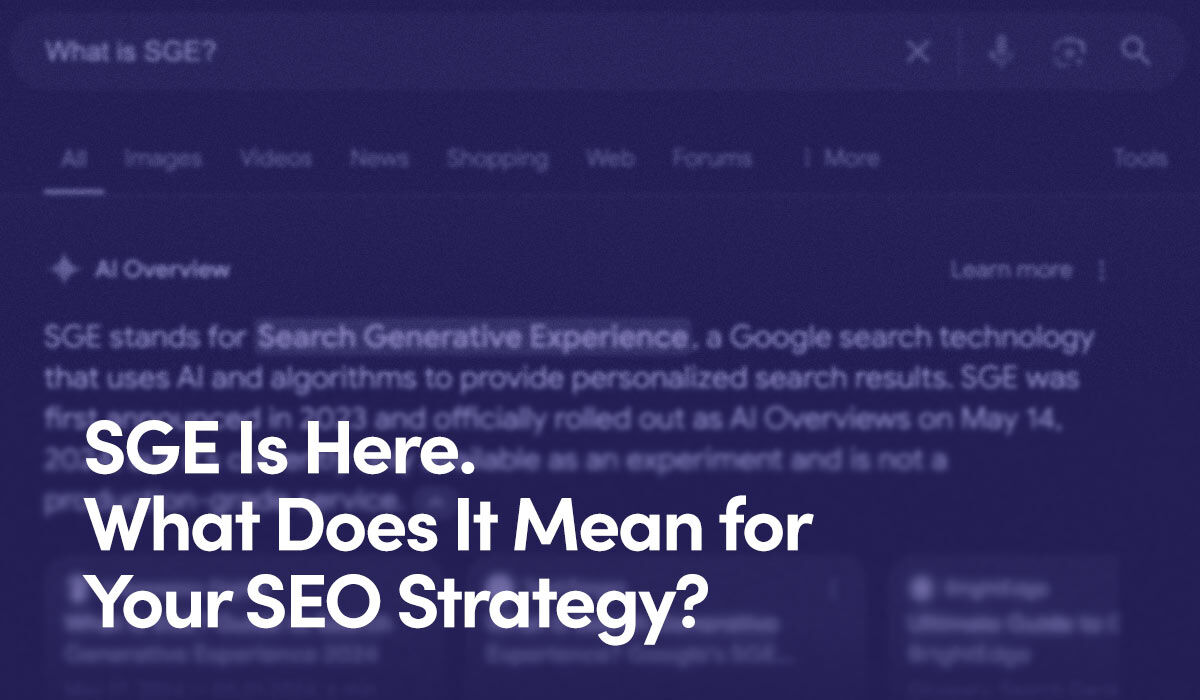When OpenAI flipped the ‘on’ switch for ChatGPT, any initial scoffs and groans were quickly replaced by a chorus of incredulity like “Huh, interesting,” and “Wow, it can do that?” Suddenly, that AI-powered prompt bar became the first place many people went to initiate an internet search.
That was some real heat—probably more heat than Google has felt since crushing the search engine competition early in the new millennium. So, as multi-national tech conglomerates are wont to do, Google went full galaxy brain and rewrote the code of the game they invented. To keep search relevant, they destroyed it as we know it.
What Hath Google Wrought: Understanding SGE
Google rolled out its new mission to personalize and summarize the information it gathers when we ask it a question or type anything into the old search bar. Dubbed Search Generative Experience (SGE), it is an advanced, AI-driven approach to search engines that leverages generative models and machine learning to deliver highly personalized and contextually relevant search results.
Unlike traditional search algorithms that rely heavily on keyword matching and manual optimization, SGE dynamically generates search results in real-time, taking into account a broader array of user signals and contextual information.
The result is the severely diminished prominence of the traditional 10 blue links, as AI-generated snippets and real-time content steal the spotlight on page one. Users now find most of the information they need directly within the SGE results, significantly reducing the need to click through multiple links. Zero-click searches, where users get answers without clicking any links, have already decreased the need for searchers to review the traditional 10 links. SGE is making zero-click searches even more inevitable, serving up results in a more convenient manner. As for the accuracy of the information, that’s a tad more touch and go, but Google promises truer results are on the immediate horizon.
If AI-generated search results present a bullseye in the accuracy of the info it provides, SGE could prove to be a major breakthrough for Google. But what about the rest of us—is the SEO party over?
OK, obviously this is not ideal for SEO companies or anyone heavily invested in top-of-funnel content. Those of us still kicking around in this sector are here because we figured out how to optimize for search engines and turn results into leads for ourselves and our clients. Well, what happens when Google pulls the plug on the game we’ve been playing—and mastering—for all these years?
Recent Google leaks have added to the anxiety, giving us a glimpse into how their ranking algorithm may work. This information is invaluable for SEOs who can decipher it, but it also highlights the uncertain future we face. How will SGE challenge the conventions of SEO companies? Is SEO dead or (hopefully) something a tad less dramatic? Where do we even go from here? How can we stay relevant when our relevance is all so very…relative?
How SGE Takes A Bite Out Of Traditional SEO
Remember when you could just cram a webpage with “best pizza New York” a hundred times and call it a day? What a time to be alive. You didn’t have to be good at SEO—you just had to be relentless with a handful of best practices.
Of course, that brand of “keyword stuffing” creates a horrible UX and was always destined to die out. But SEO shops got more sophisticated—and less annoying—over the years. The newest crop of SEO content developers understand user intent and create content that’s genuinely helpful.
That’s great! Right? Well, since Google Labs launched SGE, SEO researchers have been buzzing about the potential impacts. They predict a dramatic drop in organic visibility, which means fewer clicks, conversions, and revenue. Some even forecast a staggering 20 to 60 percent decrease in overall organic traffic.
It seems that even with a years-long emphasis on authoritative, engaging, and authentic content, we were still left vulnerable to Google’s algorithmic whims of SGE. For Phil Stott, Head of Client Success at Hypha HubSpot Development, the reason for this vulnerability is threefold: convenience, simplicity, and functionality.
“For publishers, the issue with SGE is that it keeps the user on Google’s results page,” says Stott. “As a user, you don’t need to click one of the 10 blue links to find the answer to your question when Google has aggregated the content and served it up for you with generative text specific to your query.”
But while that makes for a potentially great UX for Google’s users, Stott says it raises the question of how Google will continue to source those answers when they’re de-incentivizing publishers to produce that kind of content in the first place.
The evolution of SEO has always been a dance between adapting to Google’s changes and creating valuable content for users. As we step into this new era shaped by SGE, the challenge will be finding innovative ways to stay visible and relevant.
Transform Your Marketing With Strategic Content
Ready to Convert More Leads Into Loyal Customers?
Discover Our Content Engineering Expertise arrow_forwardSo Who Broke Search, Anyway?
If Google feels the need to take corrective action in the form of an AI overhaul, that must mean the quality of their platform was compromised in some way, right? Uh oh. I think we have a “hubris of man” situation, with Google playing the part of Dr. Frankenstein.
While we’re grappling with the seismic shifts brought about by Google’s SGE takeover, it’s worth noting another thorn in the side of search quality: affiliate marketing. Many users feel that search results from engines like Google and the rest are increasingly polluted with low-quality, affiliate-driven content. This isn’t just a hunch—a recent study backs it up.
Affiliate Marketing’s Impact on Search Quality
Users are increasingly frustrated by search results cluttered with content designed to drive sales through affiliate links rather than provide genuine value. Researchers spent a year monitoring 7,392 product review queries across Google, Bing, and DuckDuckGo, and the findings are telling.
- Affiliate Content Overload: All search engines showed significant issues with top-ranking pages dominated by affiliate marketing content.
- Dumbed-Down Content: Pages with more affiliate links tended to be simpler and less informative, prioritizing clicks over quality.
- Amazon Associates Dominance: The Amazon Associates program was the most prevalent affiliate network in the search results.
- SEO Spam Vulnerability: Search engines are susceptible to large-scale affiliate link spam campaigns, with AI-generated content making it harder to distinguish legitimate content from spam.
- Temporary Fixes: Despite frequent algorithm updates by search engines to tackle low-quality affiliate content, these improvements often prove short-lived.
The Broader Implications
Oh, irony. Delicious and vicious. Google created a monster with its aggressive promotion of affiliate marketing. Initially, this served Google’s purposes, driving traffic and revenue. But over time, it grew out of control, flooding search results with low-quality content. Now, this creation undermines the very foundation of search quality, forcing Google to confront and contain the beast it unleashed. SGE is Google’s latest attempt to wrest back control and tame the monster.
But there’s another layer to this story. Over the years, ads have increasingly crowded out the traditional blue links, becoming more prominent in search results. It’s no coincidence that Google’s current head of search, Prabhakar Raghavan, previously led their ads division. This shift towards prioritizing ad revenue over organic search quality signals a broader trend: Google’s search strategy might be more about maximizing profits than improving user experience.
Well, there’s some chum in the water for the cynical feeding frenzy. But where does that put us now? SGE and AI overlays and everything else that’s ostensibly working against us are here to stay—and will likely propagate further. What are marketing shops to do?
Adapting to the New SEO Game: What’s Next?
1. Paradigm Shift in SEO
- Everything is changing: Embrace the evolving landscape of search.
- Best practices remain: Fundamentals still matter.
2. Sticking to SEO Basics
- Top-of-the-funnel content: Essential for teaching search engines.
- Focus on quality engagements: Shift towards meaningful interactions and conversions.
3. Broadening Your Reach
- Move beyond Google’s algorithm: Create original, helpful content.
- Diversify content distribution: Publish in various platforms to build resilience.
4. Paying to Play
- SGE answers impact: Traditional organic strategies might not suffice.
- Invest in paid advertising: Keep your brand visible alongside SGE answers.
5. Embracing Natural Language Processing
- The future is natural language and voice interactions: Technologies like ChatGPT are changing the game.
- Optimize for voice search: Craft conversational content and stay updated with trends.
Adapting to the New SEO Game: What’s Next?
Let’s get real: chances are this isn’t the only article you’ve come across on this topic. It’s a totally new frontier in search land—not just for SEO companies, but for businesses who pitch their tent on the internet and users who’ve been launching their web-surfing excursions from a Google homepage for decades.
“Paradigm shift” is something seemingly astute people say to sound intelligent. But in this instance, the phrase works. Everything is changing. Time rockets forward, pulling us and our technology along with it. But here’s a sliver of good news: even when paradigms shift, best practices often remain firmly in place.
Sticking to SEO Basics
Despite the upheaval, the fundamentals of SEO are still where we make our hay while the sun shines. Top-of-the-funnel content remains essential for teaching search engines what your site is about. While this content might not drive as much traffic as it used to, it sets the stage for middle and bottom-of-the-funnel content to perform well. This targeted traffic is likely to lead to meaningful interactions and conversions, particularly for B2B. The effort remains, but the focus shifts toward quality engagements.
Broadening Your Reach
Relying solely on Google’s algorithm is no longer a viable strategy. Instead, focus on creating original, helpful content rather than copycat fluff. This was underscored recently—in a somewhat snarky manner—by John Mueller, Senior Webmaster Trends Analyst and Search Relations team lead at Google. In part, he said “... work out how you can grow alternate sources of traffic, so that when search engines revamp their opinion of your site, you’ll have less strong fluctuations…” Thanks, John, we’ll work it out (and protect our livelihoods while we’re at it) by creating quality content that genuinely adds value for the audience and stands out across various platforms. This also means diversifying content distribution by publishing in places where the audience is active. This approach builds resilience against changes in any single platform’s algorithms.
Paying to Play
With SGE answering many top-of-the-funnel queries, traditional organic strategies might not be sufficient. This is where paid advertising comes into play. Consider investing in ads that appear alongside SGE answers. This approach keeps your brand visible even when organic reach drops. Strategically placed ads can capture attention and drive traffic, complementing your organic efforts.
Embracing Natural Language Processing
Admittedly, this one is a bit of a venture into the unknown. The future of search is moving beyond typed queries to natural language and voice interactions. Technologies like ChatGPT are changing how users interact with information online, creating conversations that feel more natural. As these technologies gain traction, the implications for SEO are significant. Imagine users asking virtual assistants for recommendations and getting personalized, conversational responses. Preparing for this shift means optimizing for voice search, crafting conversational content, and staying updated with technological trends.
Final Thoughts: Evolving with SEO
Maybe ChatGPT set off the chain reaction that transformed how we approach search—or perhaps Google had been planning this upheaval for a long time. At this point in the story, it doesn’t matter. Google’s SGE rewrites the rules of the game they once dominated. The challenge now is to adapt and make these changes work for us.
SEO ain’t dead. It’s not a dinosaur and a meteor didn’t cleanse the earth of its existence. But it certainly has evolved and will continue to do so. Sticking to the core principles, expanding your reach across diverse platforms, and investing in strategic ads might just be the ticket to sticking around for years to come.
As SEO professionals, our task is to innovate, to find new paths in this altered landscape, and to continue driving meaningful engagement. The game has changed, but the goal remains the same: to connect users with the content they need in the most effective way possible. The future of SEO is not about mourning the loss of the old ways, but about seizing the opportunities presented by the new ones. The heat is on, and those who adapt will find themselves leading the way in this new era of search.




